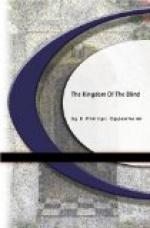“Is that yours, Sir Alfred?” he asked.
Sir Alfred nodded.
“Becoming a little more stringent, I see,” he observed, holding it up.
“I thought I recognised the mark,” the other replied. “A most outrageous mistake! I am very glad that it came under my notice. You are absolutely free from the censor, Sir Alfred.”
“I thought so myself,” Sir Alfred remarked. “However, I suppose an occasional mistake can scarcely be wondered at. Don’t worry them about it, please. My Dutch letters are simply records of the balances at my different banks, mere financial details.”
“All the same,” Mr. Gordon Jones insisted, “there has been gross neglect somewhere. I will see that it is inquired into to-morrow morning.”
“Very kind of you,” Sir Alfred declared. “As you know, I have been able to give you fragments of information now and then which would cease at once, of course, if my correspondence as a whole were subject to censorship. An occasional mistake like this is nothing.”
There was another interruption. This time a message had come from the house—Ministers would be required within the next twenty minutes. The little party—it was a men’s dinner-party only—broke up. Very soon Sir Alfred and his nephew were left alone. Sir Alfred’s fingers shook for a moment as he tore open the seal of his letter. He glanced through the few lines it contained and breathed a sigh of relief.
“Come this way, Ronnie,” he invited.
They left the dining-room and, eschewing the inviting luxuries of the billiard room and library, passed into a small room behind, plainly furnished as a business man’s study. Granet seized his uncle by the arm.
“It’s coded, I suppose?”
Sir Alfred nodded.
“It’s coded, Ronnie, and between you and me I don’t believe they’ll be able to read it, but whose doing is that?” he added, pointing with his finger to the envelope.
“It must have been a mistake,” Granet muttered.
Sir Alfred glanced toward the closed door. Without a doubt they were alone.
“I don’t know,” he said. “Mistakes of this sort don’t often occur. As I looked around to-night, Ronnie, I thought—I couldn’t help thinking that our position was somewhat wonderful. Does it mean that this is the first breath of suspicion, I wonder? Was it really only my fancy, or did I hear to-night the first mutterings of the storm?”
“No one can possibly suspect,” Granet declared, “no one who could have influence enough to override your immunity from censorship. It must have been an accident.”
“I wonder!” Sir Alfred muttered.
“Can’t you decode it?” Granet asked eagerly. “There may be news.”
Sir Alfred re-entered the larger library and was absent for several minutes. When he returned, the message was written out in lead pencil:—
Leave London June 4th. Have flares midnight Buckingham
Palace, St.
Paul’s steps, gardens in front of Savoy.
Your last report received.




